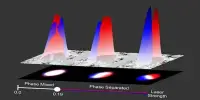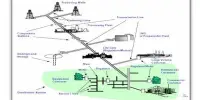A paper co-authored at the University of Strathclyde lays out a road map for the future of quantum simulation. Quantum computers are enormously powerful devices with speed and calculation capabilities far beyond the capabilities of classical, or binary, computing. It operates on superpositions, which can be zeroes, ones, or both at the same time, rather than a binary system of zeroes and ones.
The ever-evolving development of quantum computing has led to an advantage over classical computers for an artificial problem. It may have future applications in a variety of fields. One promising class of problems involves the simulation of quantum systems, which has potential applications such as battery development, industrial catalysis, and nitrogen fixation.
The paper, published in Nature, explores near- and medium-term possibilities for quantum simulation on analogue and digital platforms to help evaluate the potential of this area. It has been co-written by researchers from Strathclyde, the Max Planck Institute of Quantum Optics, Ludwig Maximilians University in Munich, Munich Center for Quantum Science and Technology, the University of Innsbruck, the Institute for Quantum Optics and Quantum Information of the Austrian Academy of Sciences, and Microsoft Corporation.
There has been a great deal of exciting progress in analogue and digital quantum simulation in recent years, and quantum simulation is one of the most promising fields of quantum information processing. It is already quite mature, both in terms of algorithm development, and in the availability of significantly advanced analogue quantum simulation experiments internationally.
Professor Andrew Daley
The paper’s lead author is Professor Andrew Daley of Strathclyde’s Department of Physics. “In recent years, there has been a great deal of exciting progress in analogue and digital quantum simulation, and quantum simulation is one of the most promising fields of quantum information processing,” he said. It is already quite mature in terms of algorithm development and the international availability of significantly advanced analogue quantum simulation experiments.”
“In computing history, classical analogue and digital computing coexisted for more than a half-century, with a gradual transition towards digital computing, and we expect the same thing to happen with the emergence of quantum simulation.”
“As a next step in the evolution of this technology, it is now necessary to discuss ‘practical quantum advantage,’ or the point at which quantum devices will solve problems of practical interest that are not tractable by traditional supercomputers.”

“Many of the most promising short-term applications of quantum computers fall under the umbrella of quantum simulation: modelling the quantum properties of microscopic particles that are directly relevant to understanding modern materials science, high-energy physics, and quantum chemistry.
“Quantum simulation should be possible on fault-tolerant digital quantum computers with greater flexibility and precision in the future, but it can also be done today for specific models using special-purpose analogue quantum simulators.” This is similar to the study of aerodynamics, which can be done in a wind tunnel or through simulations on a digital computer. Whereas aerodynamics frequently employs a smaller scale model to comprehend something large, analogue quantum simulators frequently employ a larger scale model to comprehend something even smaller.
“Analogue quantum simulators are now transitioning from qualitative demonstrations of physical phenomena to quantitative solutions for native problems. In the near term, the development of a variety of programmable quantum simulators that combine digital and analog techniques is particularly exciting. This has a lot of potential because it combines the best features of both sides by using native analogue operations to generate highly entangled states.”
The University of Strathclyde, as well as all of the partners on this perspective article, have large, active programs involving both architecture theory and algorithm development, as well as platform development for analogue quantum simulation and digital quantum computing. The partners have been working together as part of the PASQuanS EU Quantum Technologies Flagship project funded by Horizon 2020. Strathclyde University’s research in this area is deeply rooted in the UK’s national quantum technology program and has received significant funding from UK Research and Innovation.
















